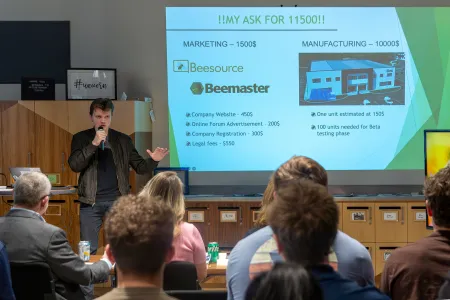Walk into the "World of Business" class at Ithaca College's School of Business and you won't find any textbooks or traditional exams. Instead, you'll hear the buzz of teamwork, the energy of live pitches, and the genuine excitement of students discovering where they fit in—and what they love about—business.
Recently reinvigorated as part of the School’s new strategic plan, the course is designed as a supercharged introduction to all the subfields of business. It’s immersive and hands-on in ways that go far beyond a typical first-year class.
"In the end, it all comes down to how we learn," says Dean Michael Johnson-Cramer. "Many business schools start with theory, then struggle to get students to apply it. We start with experiences—pitching ideas, analyzing markets, building ventures, getting messy, taking risks. Students arrive at their next class eager to dig deeper and learn new ways to solve the challenges they’ve encountered.”
The course’s innovative design was recognized during Ithaca College’s recent AACSB reaccreditation—a rigorous review process that affirms a business school's commitment to excellence, continuous improvement, and preparing students for the future of business.
Each Monday, about 100 first-year students gather for a lecture featuring faculty and guest speakers. Wednesdays and Fridays, they break into smaller groups of about 20 to dig deeper into the week's topic. And instead of tests, they pitch: first a marketing campaign, then a stock analysis, and finally a venture concept of their own creation.


